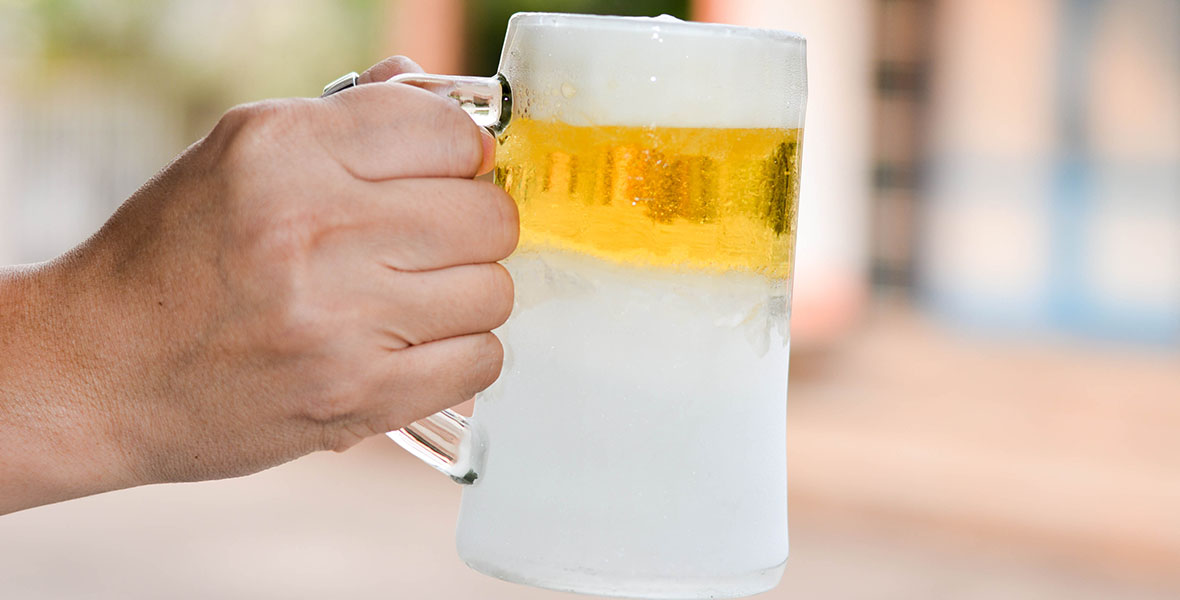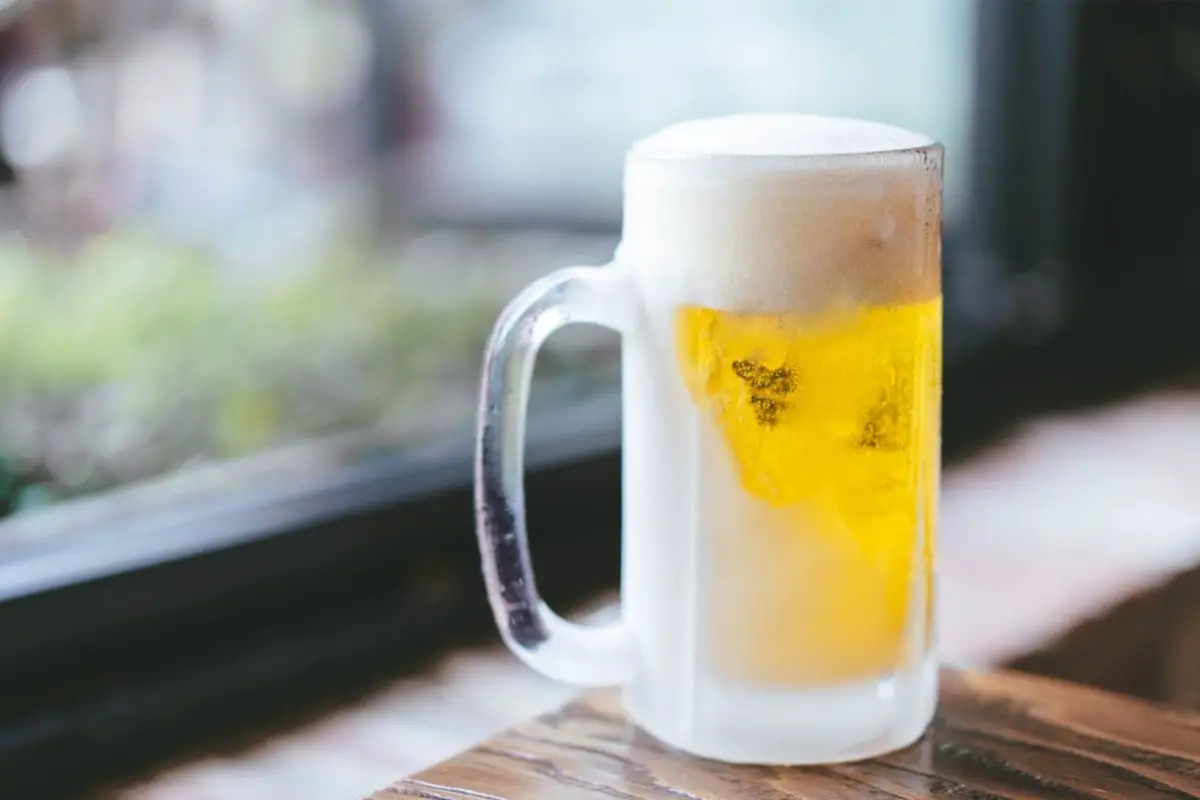We all love enjoying the delicious taste of cool beer. It adds a unique richness of flavors to the drink. But what if your beer freezes instead of getting cool only?
Yes, beer freezes too. It freezes around 28 degrees Fahrenheit or -2.2 degrees celsius mostly. However, not all types of beer freeze at this temperature. Some beers freeze at temperatures lower than -2.2 degrees celsius mostly, while others at a higher temperature. It varies according to the total alcohol content present in it, sugar, and other composition.
Yearning to know at what temperature beer freezes and why it varies from one drink to another? Then cheer up as this article reveals all the nitty-gritty about it.
Table of Contents
ToggleWhat Temperature Do Most Beers Freeze Generally?
Before answering the temperature at which beer freezes, let’s clear a common myth. Some people believe that beer can’t freeze as long as you live in an ice world. But that isn’t true.
Beers are not pure ethanol like vodka. Instead, their prime composition contains water with only 4 to 6% alcohol mostly.
Generally, it freezes around:
- 28 degrees Fahrenheit
- -2.2 degrees celsius
- 270.95 kelvin
However, the exact freezing temperature varies according to the alcohol present in it. For example, beer that contains nearly 3 percent ethanol is expected to freeze at 30.2°F, while that containing 10% ethanol is known to have a freezing point of 25.7°F.
How Long Does Beer Take To Freeze?
How long a beer takes to freeze depends solely on its composition and the alcohol content present in it.
Generally, light beers with low ABV percentages freeze earlier than strong beers. Light beers freeze within 2 to 3 hours of freezing, while strong beers take more than 6 hours to freeze.
What Makes Different Beers Freeze At Different Freezing Points? Learn About Freezing Point Depression
The unique property of ethanol that causes different beers to have different freezing points is freezing point depression.
When you add ethanol to any liquid, ethanol has the property to reduce its freezing point. This causes the obtained beer mix to freeze at a lower temperature than that of pure water.
What Makes The Freezing Point Of A Beer Vary? Three Factors To Consider

Now that we are up with the basic know-how of the temperature at which beer freezes let’s enlist the factors on which the freezing point of a beer depends.
1. Amount of Alcohol
The first factor that affects the freezing point of beer is its ABV. Beers with more significant amounts of ethanol have lower freezing points and take longer to freeze. On the other hand, beers containing relatively less ethanol freeze easily.
For example, beer with
- 3% alcohol freezes at -1°C
- 4% alcohol freezes at -1.3°C
- 5% alcohol freezes at -1.6°C
- 6% alcohol freezes at -2°C
- 7% alcohol freezes at -2.4°C
- 8% alcohol freezes at -2.8°C
- 9% alcohol freezes at -3.1°C
- 10% alcohol freezes at -3.5°C
2. Sugar Content
Similarly, sugar or sugary syrup added to beer to enhance its taste is yet another factor that impacts the freezing point of beer.
Sugar is known to prevent water from condensing, and thus, it further lowers the freezing temperature.
The greater the amount of added sugar, the lower the freezing temperature of the beer.
3. Size of Container
The size of the container in which beer is present matters too. For example, beer present in a keg takes a longer time to freeze as compared to a small 250 ml bottle.
What Will Happen If My Beer Freezes?
If your beer freezes, you will definitely end up either losing the drink completely or its flavors.
Actually, beer is known to comprise 90% water. So, when you freeze beer, the water content in it starts to expand. This results in pressure build-up inside the bottle, ultimately causing the bottle to explode.
And if you are lucky enough that your beer bottle doesn’t explode, here are a few consequences you will come across.
First of all, the beer will become flat. The reason is that when water expands, carbonation evaporates at a faster pace, thus leaving the drink with no sparkle. Instead, you will have a slushy, frozen water-like beer.
Secondly, the increased water content will make the beer taste a bit off.
How to Restore My Beer After It Freezes?
Oh, you ended up freezing your beer, and now you are least up with what to do?
Here are some known ways that can help you enjoy the same beer taste again.
1. Thawing
Thawing includes opening the bottle, mixing it, and then placing it in a microwave at low hearing. It helps to melt the ice.
But remember not to put the beer bottle in warm water directly as a sudden temperature and pressure change can cause the biggest to explode.
2. Turn into Beer Margarita
Yes, you can turn the drink into a delicious beer margarita. Just take margarita lime distillate, and add the frozen beer ice flakes to it. And here you go!
Enjoy the unique drink.
Apart from this, you can opt for decanting the drink to get concentrated beer, marinating steak with beer, etc.
How To Chill Your Beer? The Safest Way To Consider
The safest yet easiest way to chill your beer without exploding or losing flavor is by placing it in an ice water bath. Immerse the bottle in the ice water bath containing chilled ice for 10 to 15 mins. However, during the process, keep stirring the bottle to avoid ice flake formation.
Another way that you can opt to chill your beer is by placing it in the refrigerator for half an hour.
Final Verdict
All in all, generally, beer freezes at -2.2°C or 28°F. However, the freezing temperature varies according to the exact composition of the beer.
Beer containing more ethanol and sugar has a low freezing point as compared to those having low ethanol and less sugar. The reason is that ethanol has a freezing point depression property.

I am a passionate beer connoisseur with a deep appreciation for the art and science of brewing. With years of experience tasting and evaluating various beers, I love to share my opinions and insights with others and I am always eager to engage in lively discussions about my favorite beverage.
















